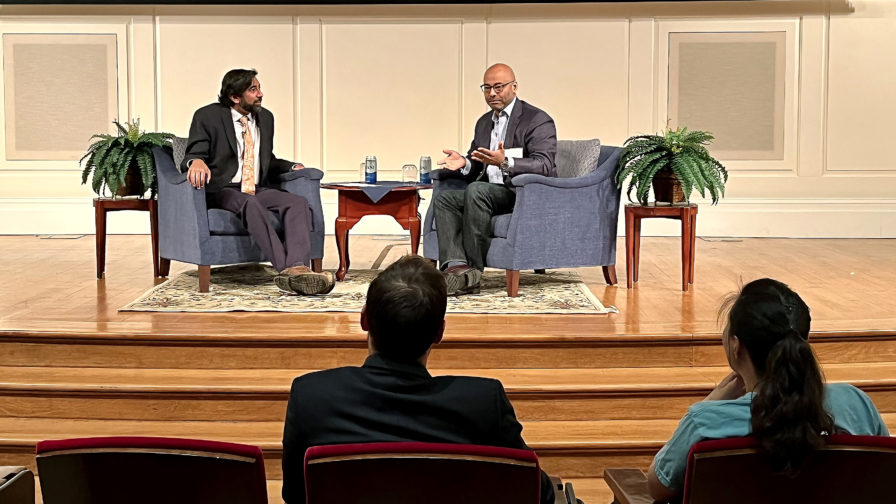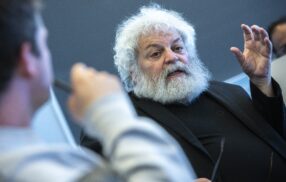
Ethics as Opportunity: Darden Alum Charts New Path for Truist
By Dave Hendrick
Truist Enterprise Ethics Officer Arnold Evans’ (MBA/JD ’97) job was created in the wake of the Wells Fargo banking scandals, when the financial services giant was found to have opened thousands of accounts in customers’ names without their informed consent.
The long-running fallout from the scandal tarnished Wells Fargo’s reputation and brought significant financial penalties and legal ramifications that continue to this day. Truist precursor SunTrust responded by moving ethical considerations to the fore, and with Evans taking the lead, ethics has become enmeshed in the practices of the bank in its previous and now larger iteration.
According to Evans, who recently spoke at the Ethics Conference at the University of Virginia Darden School of Business, leadership at SunTrust set out to ensure that the company’s culture and practices were not conducive to unethical risk taking. As the company sought someone to lead up a new ethics division, Arnold’s unique background made him a leading candidate.
A graduate of the United States Military Academy at West Point, Evans holds a law degree from the UVA School of Law and an MBA from Darden, where he also serves on the board of trustees.
“The important part of the creation of this job was to put someone in a role where they could shut things down if they saw issues that looked problematic,” said Evans, who had roughly two decades of experience in both investment banking and commercial banking when he took the ethics-focused role in 2017. “And I was one of the few people who had broad understanding and expertise and awareness — and a certain peculiar background related to ethics.”
Evans was serving as President and CEO of a SunTrust’s Central Florida division in Florida before focusing on ethics. Rather than a career detour, the position was an opportunity to further distinguish himself within the organization, he said. The role required regular interaction with the executive leadership team and the company’s board, for instance.
After establishing a new ethics-focused unit at SunTrust, Evans was asked to grow and expand his own role roughly two years later following the merger of SunTrust and BB&T. Now Enterprise Ethics Officer and Executive Vice President at Truist, Evans is socializing policies and practices for a much larger organization and has been empowered by the company’s leadership to expand the role as he saw fit, so long as he was “objective and transparent.”
Evans said his job often involves “ensuring we have all of the right people in the room” as the company works through thorny issues, which could range from considering how workers are incentivized to how the company is seeking to meet certain ESG targets.

Truist’s promise of “care” puts ethical considerations at the center of the brand
Working in a heavily regulated industry, Evans said compliance with rules and regulation is the bare minimum when it came to ethical obligations. The opportunity for a bank that wants to stand out from the competition is to demonstrate to consumers that more is being done for consumer interest and protection. Evans cited the rapid decline of overdraft fees, which he predicted would likely be gone at most major banks in the near future, as one such example.
Asked by Professor Bobby Parmar if the bank saw an increased interest in ethics from applicants or young colleagues, Evans said he sees people looking at jobs who want to know “who we support, why we support them … and how we support our communities.”
Evans encouraged Darden MBA students to pursue a role at company whose values were compatible with their own. Moreover, if a company has a vocal stance on issues of importance to an employee, employees should seek to understand the “timeline” of the change they hope to see, Evans said.
If a company has an explicit commitment to environmental targets related to carbon emissions, for instance, understand the milestones and speak up if the company’s actions don’t seem to match its words.
There is ultimately “tremendous value” for the professional and company in speaking up for your values, Evans said.
In addition to a conversation with Evans, the Darden Ethics Conference, which was presented by the Business Ethics at Darden Club, featured a range of panels with alumni and professors.
The University of Virginia Darden School of Business prepares responsible global leaders through unparalleled transformational learning experiences. Darden’s graduate degree programs (MBA, MSBA and Ph.D.) and Executive Education & Lifelong Learning programs offered by the Darden School Foundation set the stage for a lifetime of career advancement and impact. Darden’s top-ranked faculty, renowned for teaching excellence, inspires and shapes modern business leadership worldwide through research, thought leadership and business publishing. Darden has Grounds in Charlottesville, Virginia, and the Washington, D.C., area and a global community that includes 18,000 alumni in 90 countries. Darden was established in 1955 at the University of Virginia, a top public university founded by Thomas Jefferson in 1819 in Charlottesville, Virginia.
Press Contact
Molly Mitchell
Associate Director of Content Marketing and Social Media
Darden School of Business
University of Virginia
MitchellM@darden.virginia.edu




